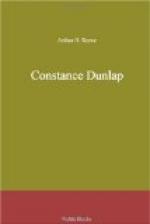He was gone, with a mocking smile at the parting shot.
Anita Douglas saw it all now. Things had not been going fast enough to suit her new friend, Mrs. Murray. So, after a time, she had begun to tell of her own escapades and to try to get Anita to admit that she had had similar adventures. It was a favorite device of detectives, working under the new psychological method by use of the law of suggestion.
She had introduced herself, had found out about Lynn Munro, and in some way, after he had left town, had got the letters. Was he in the plot, too? She could not believe it.
Suddenly the thought came to her that the blackmailers might give her husband material that would look very black if a suit for divorce came up in court.
What if he were able to cut off her little allowance? She trembled at the thought of being thus cast adrift on the world.
Anita Douglas did not know which way to turn. In her dilemma she thought only of Constance. She hurried to her.
“It was as you said, a frame-up,” she blurted out, as she entered Constance’s apartment, then in the same breath added, “That Mrs. Murray was just a stool pigeon.”
Constance received her sympathetically. She had expected such a visit, though not so soon.
“Just how much do they—know?” she asked pointedly.
Anita had pressed her hands together nervously. “Really—I confess,” she murmured, “indiscretions—yes; misconduct—no!”
She spoke the last words defiantly. Constance listened eagerly, though she did not betray it.
She had found out that it was a curious twist in feminine psychology that the lie under such circumstances was a virtue, that it showed that there was hope for such a woman. Admission of the truth, even to a friend, would have shown that the woman was hopelessly lost. Lie or not, Constance felt in her inmost heart that she approved of it.
“Still, it looks badly,” she remarked.
“Perhaps it does—on the surface,” persisted Anita.
“You poor dear creature,” soothed Constance. “I don’t say I blame you for your—indiscreet friendships. You are more sinned against than sinning.”
Sympathy had its effect. Anita was now sobbing softly, as Constance stole her arm about her waist.
“The next question,” she reasoned, considering aloud, “is, of course, what to do? If it was just one of these blackmailing detective cases it would be common, but still very hard to deal with. There’s a lot of such blackmailing going on in New York. Next to business and political cases, I suppose, it is the private detective’s most important graft. Nearly everybody has a past— although few are willing to admit it. The graft lies in the fact that people talk so much, are so indiscreet, take such reckless chances. It’s a wonder, really, that there isn’t more of it.”
“Yet there is the—evidence, as he called it—my letters to Lynn— and the reports that that woman must have made of our—our conversations,” groaned Anita. “How they may distort it all!”




